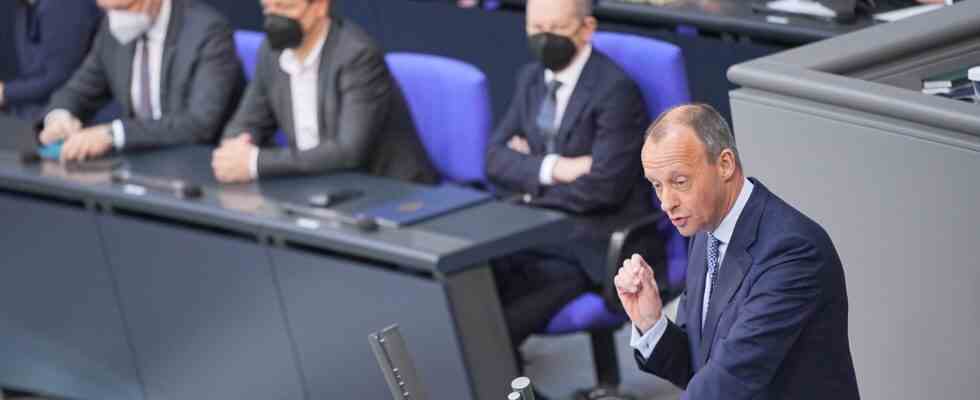analysis
Status: 03/23/2022 4:01 p.m
The Russian war of aggression in Ukraine also determines the debate in the Bundestag. But the unity of the first days has evaporated. It’s also because of the money.
Actually, it’s just a mini-budget: 3.7 billion euros are earmarked for the Chancellery. That is less than one percent of the entire federal budget, which so far provides for expenditure of almost 460 billion euros. But the debate about this small budget item is about the big lines of politics. About the central plans of the government and the central criticisms of the opposition.
Without the Ukraine war, on a day like today, the focus would be on climate protection, digitization, social security – i.e. the topics that the traffic light partners agreed on in their coalition agreement. But since February 24, Russia’s attack on Ukraine, everything has changed. Shortly afterwards, Chancellor Olaf Scholz spoke of a turning point. When he made his government statement on February 27, he not only received applause from the government factions SPD, Greens and FDP, but also from the standing ranks of the CDU/CSU.
On that day, Scholz broke with many long-held beliefs: Not only should sanctions be tightened, but German weapons should also be delivered to Ukraine. When he then announced an investment program of 100 billion euros for the Bundeswehr and promised to put more than two percent of economic output into the defense budget every year, many believed they could not believe their ears. Some, with the Greens and SPD, because it went against their previous principles, the others, with the Union, because they saw their old demands confirmed.
No no-fly zone
It is important to remember this because it marks the clear difference from today’s general debate on the budget. On the one hand in the governing coalition: It is noticeable how Scholz is now approaching the doubters in his own ranks. He emphasizes that there will be no no-fly zone, that NATO will not intervene directly in the Ukraine war, and that anything else would be irresponsible. He explicitly praises the Green Foreign Minister and the Green Economics Minister. And he emphasizes that the government is sticking to the energy transition and the goal of climate neutrality by 2045, despite the current problems with energy procurement.
The embarrassing moment after Zelenskyj’s speech
In doing so, the chancellor accepts that he remains uncertain in other respects. He says: “Ukraine can rely on us.” But it remains unclear what that means in the current situation. The embarrassing moment when the Bundestag, after the video speech by President Volodymyr Zelenskyj just under a week ago, just went back to business as usual.
Of course, and a glance at the opposition shows that: Almost all parties are finding it difficult to accept Zelenskyy’s almost imploring request to support Ukraine in defending itself against Russia. “To this day we have not found a way to end this crime,” admits Union parliamentary group leader Friedrich Merz, referring to Putin’s war, which is being waged “increasingly brutally against the civilian population”.
Otherwise, the similarities between the chancellor and the leader of the opposition end there. And much faster than it looked three weeks ago. Merz justifies it like this: Ultimately, the coalition does not draw any conclusions from the turning point propagated by Scholz, in fact large parts of the coalition agreement are lapsed.
Merz challenges the traffic light coalition
It is becoming clear: the Union, which is being courted by the traffic light coalition because of the desired amendment to the Basic Law for the Bundeswehr billions, wants to make it as difficult as possible for the government. Merz attaches approval to conditions that represent a high hurdle, especially for the Greens and the left wing of the SPD.
Merz is really challenging the traffic light: If all the deputies of the traffic light parties don’t vote for the Bundeswehr billions, there will be no change in the Basic Law. And even with other traffic light projects, the Union will not play the “substitute bench” for a lack of majorities in the coalition.
The Union’s calculus is likely to be to politically use the differences that have emerged within the traffic light coalition in recent weeks. When dealing with the corona pandemic, the differences between the FDP on the one hand and the SPD and Greens on the other could not be overlooked.
In the debate about further relief because of the high energy prices, Finance Minister Christian Lindner got into trouble because of his advance with a tank discount. And when it comes to military spending, there are again front positions within the traffic lights.
“Largest Armament Budget”
The speech by SPD parliamentary group leader Rolf Mützenich shows how difficult it is for large parts of the coalition to meet the 100 billion euros.
And he points out that Germany already has the “largest armaments budget” in Europe. On the other hand, a contribution by the former FDP General Secretary Linda Teuteberg shows that there are tensions within the traffic light on this topic. She reminds – albeit without naming – that Brandenburg’s SPD Prime Minister Dietmar Woidke had criticized NATO tank transfers to Poland just a few years ago.
Foreign Minister Annalena Baerbock sounds forgiving when presenting her own budget: everyone must now acknowledge past mistakes in order to do better in the future. A few years ago, the Greens would certainly not have launched a special fund for the Bundeswehr, said the Foreign Minister, adding: “But is that a weakness? I think it’s an absolute strength: Now we have to change our policy.” And turned towards the Union: “Let’s change it together.”
It is not yet clear whether this appeal will work. The demonstrative unity between the traffic light parties and the Union after the Russian attack on Ukraine is hardly noticeable. The negotiations for the desired amendment to the Basic Law for the Bundeswehr special fund are becoming difficult.

